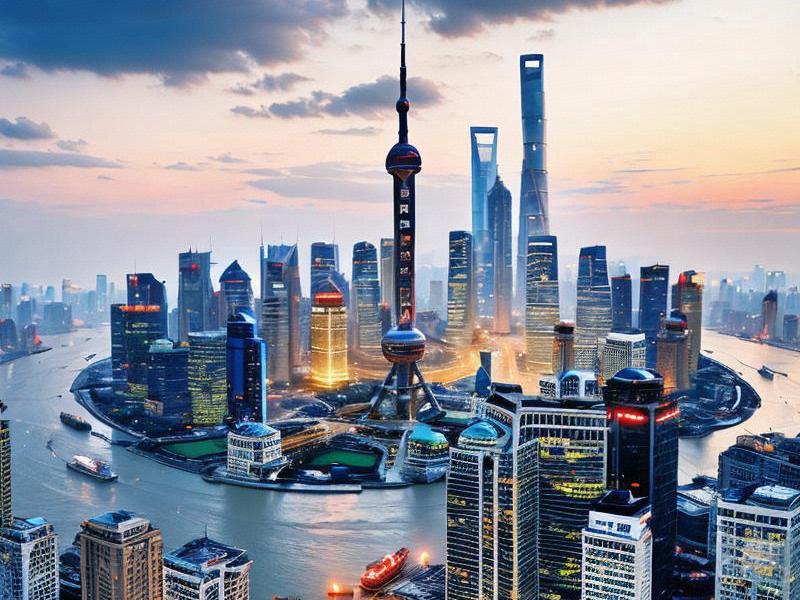
Shanghai, often referred to as the "Pearl of the Orient," stands as a beacon of China's economic and cultural progress. Over the past few decades, this vibrant metropolis has undergone a remarkable transformation, evolving from a traditional port city into a global powerhouse. Its skyline, a blend of historic architecture and modern skyscrapers, is a testament to its dynamic spirit.
The urban development of Shanghai is nothing short of spectacular. The city has successfully balanced rapid expansion with the preservation of its rich historical heritage. Iconic landmarks such as the Bund and the Old City retain their charm, while futuristic structures like the Shanghai Tower and the Jin Mao Tower redefine the city's skyline. This harmonious coexistence of old and new is a hallmark of Shanghai's urban planning philosophy.
One of the key drivers behind Shanghai's urban transformation is its strategic location. Situated at the mouth of the Yangtze River, Shanghai serves as a vital gateway for trade and commerce. The city's deep-water ports and extensive transportation network have made it a linchpin in China's Belt and Road Initiative, facilitating the flow of goods and people across continents.
The economic hub of Shanghai is another aspect that sets it apart. As one of China's four municipalities directly under the central government, Shanghai boasts a robust economy driven by a diverse range of industries. Finance, technology, manufacturing, and trade are the pillars of its economic prowess. The city is home to the Shanghai Stock Exchange, one of the largest in the world, and is a major center for international finance.
新上海龙凤419会所 The financial district of Lujiazui is a hive of activity, with skyscrapers housing some of the world's leading banks and financial institutions. The area's rapid development has attracted talent and investment from around the globe, making Shanghai a key player in the global financial market. The city's commitment to innovation is evident in its thriving technology sector, with startups and established companies alike driving advancements in artificial intelligence, biotechnology, and other cutting-edge fields.
Cultural integration is another defining feature of Shanghai. The city's history as a melting pot of cultures has resulted in a unique blend of traditions and modernity. This cultural diversity is reflected in the city's architecture, cuisine, and arts scene. The Bund, with its colonial-era buildings, offers a glimpse into Shanghai's past, while the Pudong New Area showcases the city's futuristic aspirations.
Shanghai's culinary scene is a testament to its cultural diversity. From traditional Shanghainese dishes like xiaolongbao (soup dumplings) and shengjianbao (pan-fried buns) to international cuisines, the city offers a gastronomic adventure for every palate. The vibrant night markets and bustling food streets are a testament to the city's love for food and its ability to cater to diverse tastes.
The arts scene in Shanghai is equally vibrant. The city hosts numerous cultural festivals, art exhibitions, and music concerts throughout the year. The Shanghai International Film Festival, one of the oldest and most prestigious film festivals in Asia, attracts filmmakers and audiences from around the world. The city's museums and galleries showcase a rich collection of art, from traditional Chinese paintings to contemporary works.
上海花千坊龙凤 Shanghai's increasing global influence is evident in its role as a center for international diplomacy and cooperation. The city has hosted numerous high-profile international events, including the G20 Summit and the Belt and Road Forum for International Cooperation. These events underscore Shanghai's importance as a global player and its commitment to fostering international partnerships.
The city's efforts to enhance its global connectivity are also noteworthy. Shanghai is home to the Hongqiao International Airport, one of the busiest airports in the world, and the Shanghai Maglev Train, the fastest commercial train in operation. These transportation hubs facilitate seamless travel and trade, connecting Shanghai to major cities across the globe.
Shanghai's commitment to sustainability and environmental protection is another aspect that sets it apart. The city has implemented various initiatives to reduce pollution, promote green energy, and improve urban living conditions. The construction of the Zhangjiang Hi-Tech Park, a hub for high-tech industries, reflects the city's focus on innovation and sustainable development.
上海喝茶群vx The city's efforts to preserve its natural environment are equally commendable. The Shanghai Botanical Garden, a serene oasis in the heart of the city, offers a glimpse into Shanghai's commitment to green spaces and biodiversity. The city's waterfront parks, such as the Century Park and the Huangpu River waterfront, provide residents and visitors with opportunities to enjoy nature amidst the urban landscape.
Shanghai's educational institutions are also playing a crucial role in shaping the city's future. Renowned universities like Fudan University and Tongji University attract students and researchers from around the world, fostering a culture of academic excellence and innovation. These institutions are at the forefront of research in various fields, contributing to the city's economic and technological advancements.
The city's youth and creative industries are another source of inspiration. Shanghai's vibrant startup ecosystem and its support for young entrepreneurs have led to the emergence of numerous innovative companies. The city's creative industries, including fashion, design, and media, are thriving, reflecting the city's dynamic spirit and its ability to adapt to changing trends.
In conclusion, Shanghai is a dynamic metropolis that is shaping the future of China and the world. Its rapid urban development, economic hub status, cultural integration, and increasing global influence make it a unique and important city. As Shanghai continues to evolve, it remains a symbol of China's progress and a beacon of hope for a better future.
